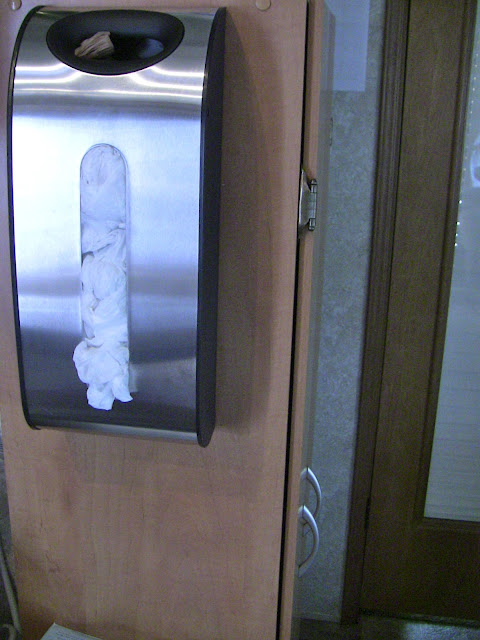If you search on Google for "green RV", you'll find 100's of articles, such as
this fine Peter Greenberg article.
You cannot doubt that innovation will continue around fuel efficiency, lower weight, better insulation, more efficient heating and cooling among other innovations.
Beyond energy efficiency, green RV's have the added advantage that you can dry-camp or boon dock longer, you can do more stops without hookups, you can get by with a smaller tow vehicle or engine, you can make less runs to buy LP. Green is actually a BETTER RV experience. So all the built in incentives have been in place from the beginning of time - regardless of your position on green today. In other words, RV users would prefer green due to the conveniences even if they didn't care about green!
But there are huge shifts in the American economy taking place that may forever change the relationships to RV's.
First, while I am not a full-timer, Sheri my wife, full-timed for two years in Puma. But it is my observation that the full-timers are WAY ahead of the rest of us for bunches of reasons you may have never considered.
1) Since when is living in a 1500 square foot house an entitlement? Prior to 1950 (approx) people lived in smaller houses. It seeems that around 1960 on to about now (2009/2010) the trend has been to get bigger houses. But do you really NEED that space. And now with mortgages being more difficult to get, and American employment less secure, the reality is that homes will be smaller. To a degree, the RV is the perfect small home and you can locate it anywhere you want! In general, living in less space and consuming less space should be the future trend.
2) Go where the jobs are! The idea of staying rooted just isn't what it used to be. For many reasons, people are more mobile than ever. Also, the American economy benefits when a free flow of labor can occur. Look at the problems in Michigan with the car company troubles. A more mobile attitude would allow those people to relocate much quicker. That relocation would get them jobs, and to the chagrin of some, lower wages in the areas with employent. But you know - we're going to have to get used to lower wages. They aren't the end of the world, just the end of too much greed. RV's are the most mobile of homes - sturdy, mobile and you can have fun vacationing, meeting new people, and visiting new areas.
3) Take your job with you. Related to #2, if you can use the network and the computer to make a living, why stay in one spot! RV's are a great place to live if you are a techie and don't have a lot of stuff.
4) American's wealth relative to other nations is coming more inline with reality. We had it great folks but really, we were an abnormality of sorts. Our wealth was unprecedented. I don't see a huge economic disaster with the Obama spending, because our economy - so far - has been good at fairly soft landings, but I think that when all the dust clears, we'll realize that we all will have to live with just a little bit less and have a more realistic attitude regarding our earning power, and consequently our ability to have 'things'. RV's are nice because if you have one and try to live in one, then you learn that 'stuff' isn't so important. RV's make sure that you carry with you, only the most necessary items.
5) If you think about an outdoor house concept, like Sheri and I are thinking, then that will use the RV as the environmentally tightly controlled living shell with a covered but open area that uses non-traditional methods of climate control for MOST of our living. Our goal is to spend most of our days outside! This should be the ultimate in living BIG while living GREEN (because the environmental control zone is small) and lowering the cost and environmental footprint of the home (because the materials are simple - avoiding insulation, avoiding synthetic flooring and more). RV's can and will be an INTEGRAL part of that concept, even if the the 'shell' won't be a true RV in the sense of the word.
These are some thoughts I have had about RV's and the new economy (green, less, and mobile). What do you think? Leave some comments that add to the discussion or give me pause to rethink things.
 and we've been using it for several months now and have been thrilled with the product. On the links I'll point you to equivalents on Amazon.
and we've been using it for several months now and have been thrilled with the product. On the links I'll point you to equivalents on Amazon. 







